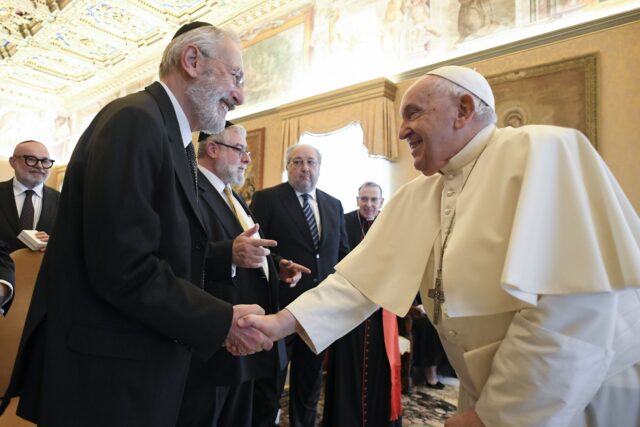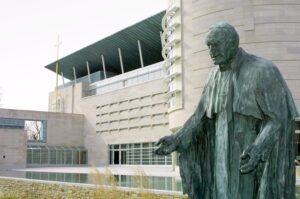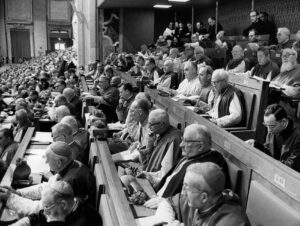
WASHINGTON — Influential religious leaders reminded Catholics of their responsibility to combat antisemitism while celebrating the 60th anniversary of “Nostra Aetate,” a transformative church document in Catholic-Jewish relations, in the nation’s capital.
“To be Catholic is to believe that we will answer someday for what we’ve done, including for how we rose to the occasion — or didn’t — of being our brother’s keepers,” Mary Eberstadt, senior research fellow at the Faith & Reason Institute and the Panula chair in Christian culture at the Catholic Information Center, said Oct. 28 in a speech delivered by video.
Eberstadt and other experts spoke at a conference commemorating “Nostra Aetate” (“In Our Time”), the Second Vatican Council’s 1965 Declaration on the Relationship of the Church to Non-Christian Religions, at the St. John Paul II National Shrine in Washington. The day of reflection, “Called to Friendship: Nostra Aetate at 60: The Spiritual Heart of Catholic-Jewish Relations,” was hosted by the shrine in partnership with Philos Catholic, part of The Philos Project, a nonprofit dedicated to promoting positive Christian engagement in the Near East.
The day opened with Mass and a welcome from Kathryn Jean Lopez, senior fellow at the National Review Institute, where she directs the Center for Religion, Culture, and Civil Society, and editor-at-large of National Review.
“We gather because it is clear from that document (‘Nostra Aetate’) and from … truth and reality, that antisemitism is evil, it is a sin,” said Lopez, who served as the event’s emcee. “I might also add at the shrine dedicated to John Paul II, the author of ‘Evangelium Vitae,’ ‘The Gospel of Life,’ it’s not pro-life to hate Jews.”
The conference came after a coalition of Catholic leaders promised to combat antisemitism and to promote friendship with the American Jewish community following the terrorist attacks on Oct. 7, 2023, that began the Israel-Hamas War. The coalition was announced during a previous conference by The Philos Project and Franciscan University of Steubenville in Ohio in 2023.
Since that time, polls continue to track a rise in antisemitism. This October, two years after the Oct. 7 attacks, a joint report by the Anti-Defamation League and Jewish Federations of North America found that over half of Jewish Americans (55%) surveyed said they experienced at least one form of antisemitism in the past year.
“Nostra Aetate,” which condemns discrimination against people because of their religion and names several religions by name, specifically mentions Judaism and antisemitism.
“In her rejection of every persecution against any man, the Church, mindful of the patrimony she shares with the Jews and moved not by political reasons but by the Gospel’s spiritual love, decries hatred, persecutions, displays of anti-Semitism, directed against Jews at any time and by anyone,” it reads.

Speakers delved into the history and meaning of “Nostra Aetate,” including Gavin D’Costa, professor at the Pontifical University of St. Thomas Aquinas in Rome, who addressed Catholic Zionism, and George Weigel, distinguished senior fellow of the Ethics and Public Policy Center, or EPPC, where he holds the William E. Simon Chair in Catholic Studies, who focused on St. John Paul II.
“The council fully acknowledged that God does not repent of his covenant with the people of Israel, that Jesus and his first followers understood themselves to be sons and daughters of that covenant, that antisemitism is a grave sin, and that Jews and Catholics are providentially entangled in a way we shall never fully understand until the kingdom of God is established in its fullness,” Weigel, who delivered the keynote address, said of Vatican II.
Among other things, he added, “Nostra Aetate” teaches that “antisemitism — Jew hatred — is Christ hatred.”
In addition St. John Paul, the late Cardinal John J. O’Connor of New York was recognized as an advocate of Catholic-Jewish relations. Sister Maris Stella, vicar general of the Sisters of Life, shared how the cardinal, who began the Sisters of Life, promised to mention the dignity of the human person whenever he spoke after he visited Dachau, a Nazi concentration camp in Germany, in 1975.
“The idea of the Jewish people being the older brothers of our faith was more than a useful, poetic phrase for him,” she said. “Cardinal O’Connor said it with the affection of a younger brother, who loved, respected and looked up to his older brother.”

The speakers stressed that everyday people can also push back against antisemitism including Luma Simms, a fellow at the EPPC, who spoke about antisemitism in some immigrant communities and the healing power of Western Christianity.
As strategic adviser at The Philos Project, Phillip Dolitsky moderated a discussion about “Why Should I Care About Jewish-Catholic Relations?” Panelists included Kathryn Wolf, writer and founder of the nonprofit It Is Us; Rabbi Joshua Stanton, associate vice president for interfaith and intergroup initiatives at the Jewish Federations of North America; Yael Freimann, a strategist and organizational culture expert; Simone Rizkallah, director of Philos Catholic; and Peter Wolfgang, executive director of the Family Institute of Connecticut.
Dolitsky and Rizkallah focused on the importance of genuine friendships between Christians and Jews. Many speakers also expressed concern for rising antisemitism among younger generations, especially online. Wolfgang said that in recent years, younger generations, beginning with millennials, especially millennials online, have had a reaction against Vatican II.
Wrapping up the conference, Eberstadt also mentioned younger generations while reminding listeners that St. John Paul, Venerable Fulton J. Sheen and Cardinal O’Connor “affirm that to hate the Jews is to hate the Christians.”
“To hate your Jewish brother is to hate your Catholic self,” she said. “And unlikely as it might have seemed before the massacres of Oct. 7, the West today needs to hear that message. America, especially young America, needs to hear that message.”
She concluded by quoting Archbishop Sheen: “We must look upon the persecution of Jews and Christians today not as separate, unrelated causes but involving one another in some way because both are related to God.”








